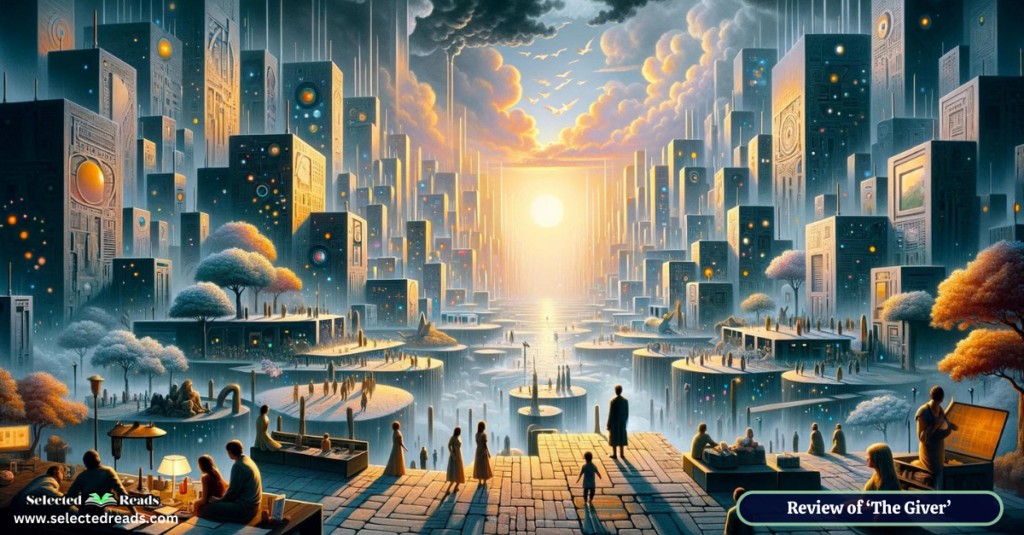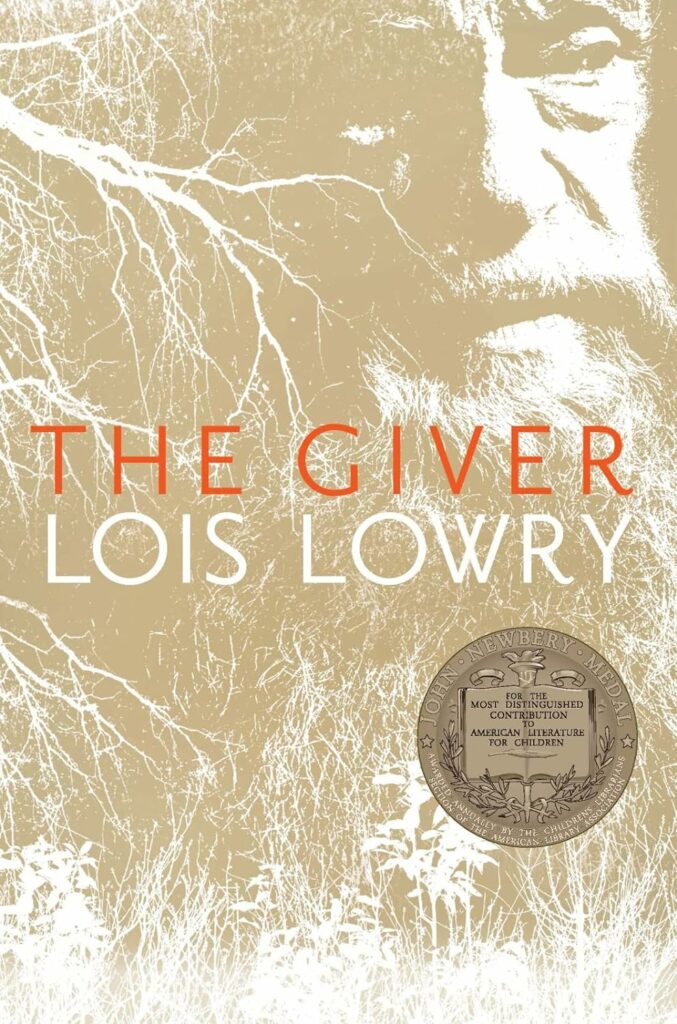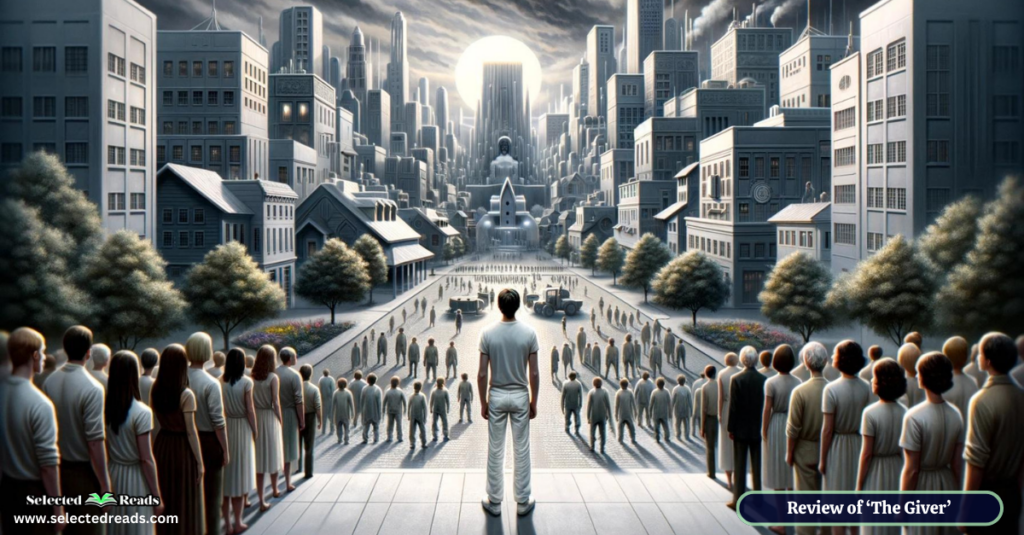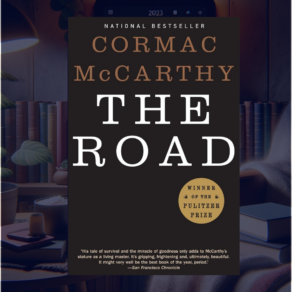Reading Lois Lowry’s seminal work, “The Giver,” offers a unique opportunity to explore the contours of a society striving for utopia, only to grapple with the complex realities of such an endeavor. As we explore the depths of this deceptively simple narrative, we uncover a rich tapestry of themes, characters, and moral quandaries that resonate far beyond the confines of its pages.
Our discussion of “The Giver,” will proceed as follows: First, we start with an extended summary that lays the groundwork for understanding the society in which Jonas, our young protagonist, finds himself. This will be followed by a deep dive into the main themes of the novel, which challenge us to question the values we take for granted and reexamine our most deeply held beliefs.
We’ll then introduce the key characters whose lives and decisions are inextricably linked to the unfolding drama of Jonas’s awakening. To enrich your reading experience or facilitate thought-provoking discussions in your book club, I’ll also provide a set of book club questions designed to spark dialogue and deepen your appreciation of Lowry’s masterful narrative.
The Giver Summary
“The Giver” by Lois Lowry is set in a dystopian future where society has eliminated pain and strife by converting to “Sameness,” a plan that has also eradicated emotional depth from their lives. Twelve-year-old Jonas is selected to inherit the position of Receiver of Memory, the person who stores all the past memories of the time before Sameness, in case they are ever needed to aid decisions that others lack the experience to make.
As Jonas receives memories from the previous Receiver, now called The Giver, he discovers the truth about his world’s history. He learns about pain, suffering, war, and all the unhappy and complex aspects of life, but he also experiences joy, love, and beauty which have been lost to his community. These revelations cause him to question the principles of his society. He realizes that the uniformity and predictability of his world come at a great cost – the loss of freedom, individuality, and authenticity.
Faced with this new understanding, Jonas becomes increasingly disillusioned with the society’s sacrifices for the sake of Sameness. The climax of the novel occurs when Jonas learns that a baby, Gabriel, whom he has grown to love, is to be euthanized for not meeting the community’s standards. Determined to save Gabriel and himself from a life devoid of ‘real’ feelings, Jonas plans a daring escape to the “Elsewhere,” an unknown world beyond their community’s boundaries, hoping to bring with them the possibility of freedom, choice, and love.
Photo: Amazon
The novel ends ambiguously as Jonas and Gabriel, nearly frozen and starving, sled down a hill towards what Jonas believes is a safe haven, filled with warmth and colored lights of a family in a house, leaving their fate open to interpretation. “The Giver” explores themes of individuality vs. conformity, the importance of memory and emotion, and the complexities of human nature.
Related; The Handmaid’s Tale Summary, Characters, and Book Club Questions
The Giver Themes
“The Giver” by Lois Lowry delves into several profound themes that resonate deeply with readers across ages, making it a staple in educational discussions and a powerful tool for critical thinking. Here are the main themes explored in the novel:
- The Importance of Memory: Central to the novel is the idea that memories, both joyful and painful, are essential to humanity. They inform our decisions, allow us to experience a full range of emotions, and help us learn from the past. The community’s choice to eliminate memories is shown to also remove the depth of human experience, questioning the cost of such a loss.
- Individuality vs. Conformity: The society in “The Giver” is built on the principle of sameness, where individual differences are erased to maintain harmony and order. Through Jonas’s eyes, we see the value of individuality and the dangers of suppressing differences to the point where people no longer see colors or feel strong emotions.
- Freedom and Control: Lowry presents a society where choices are made by the community for its citizens, ostensibly for their own good. This raises important questions about the balance between safety and freedom, and whether true happiness can exist without the ability to make one’s own choices.
- The Power of Knowledge: Jonas’s role as the Receiver of Memory highlights the power and burden of knowledge. It explores how access to information can lead to empowerment but also isolation and difficult choices. The theme underscores the idea that ignorance can be used as a tool for control.
- Courage and Sacrifice: Jonas’s decision to leave the community, despite the risks and uncertainties involved, speaks to the themes of courage and sacrifice. It’s a testament to the strength required to challenge the status quo and make sacrifices for the greater good, especially when it involves risking everything for the chance at a more authentic life.
The Giver Characters
Here’s a brief overview of the main characters and their significance in the “The Giver” by Lois Lowry:
- Jonas: The protagonist of the story, Jonas is a thoughtful and sensitive twelve-year-old boy who is selected to be the new Receiver of Memory. This role grants him access to all the memories of the past, both beautiful and painful, which were hidden from the community. Through his eyes, we explore the complexities of human emotions, the importance of memory, and the value of individuality.
- The Giver: The current Receiver of Memory, who becomes Jonas’s mentor, The Giver is a wise and patient man burdened with the memories of the entire world. He holds the community’s collective memories, including those of pain, joy, and color. His relationship with Jonas evolves from mentorship to a deep, paternal bond as he guides Jonas towards understanding and ultimately, rebellion against the community’s restrictions.
- Gabriel: A baby, or “newchild,” who is struggling to meet the community’s developmental milestones, Gabriel forms a special bond with Jonas. Jonas discovers that Gabriel can receive memories just like him, which strengthens his resolve to escape the community for both their sakes. Gabriel symbolizes hope and the future, as well as the innocence and vulnerability that the community seeks to control.
- Father: Jonas’s father works as a Nurturer, caring for newchildren before they are assigned to family units. His role brings to light the community’s cold pragmatism, especially in his unemotional stance towards “release” (euthanasia), highlighting the moral blindness induced by the community’s norms.
- Mother: Working in the Department of Justice, Jonas’s mother embodies the community’s adherence to rules and order. Her character illustrates the community’s emphasis on conformity and the suppression of deeper emotional connections within family units.
- Lily: Jonas’s younger sister, Lily is curious and talkative, providing a glimpse into the indoctrination of the community’s children. Her innocent questions and observations often prompt Jonas to think more critically about his surroundings.
- Asher: Jonas’s best friend, Asher is playful and light-hearted, sometimes struggling with the community’s strict rules of language and behavior. His character highlights the suppression of individual traits that don’t conform to the community’s standards.
- Fiona: A friend of Jonas and another character through whom we see the impact of the community’s rules. Fiona works in the Care Center for the Old, and her interactions with Jonas help to reveal the depth of emotion and human connection that the community lacks.
The Giver Book Club Questions
Here are some questions that touch on the novel’s themes, characters, and moral dilemmas, designed to spark meaningful dialogue within your book club:
- Exploring Utopia vs. Dystopia: “The Giver” presents a community that initially seems utopian because of its absence of pain and conflict. However, as the story progresses, it reveals dystopian elements. What characteristics of the community support its classification as a utopia or a dystopia? How does this duality affect your perception of the society Jonas lives in?
- The Role of Memory: Memory plays a pivotal role in the novel, with the community’s decision to eliminate personal memories in favor of sameness and contentment. Discuss the importance of memory in shaping identity. How do Jonas’s experiences with the memories challenge the community’s values?
- Emotional Depth and Humanity: The citizens of Jonas’s community do not experience emotions in the same way Jonas begins to. How do the restrictions on emotions affect the characters’ humanity? Discuss the moments in the novel where emotion or its suppression plays a key role.
- The Concept of “Release”: “Release” is used in the community as a means of dealing with those who do not conform, whether due to age, weakness, or disobedience. Discuss the ethical implications of “release.” How does the community’s acceptance of this practice reflect on their moral values?
- Individuality vs. Conformity: Jonas’s journey is one of moving from conformity towards individuality. Discuss how the suppression of individuality impacts the community. Can a society truly thrive without acknowledging and celebrating differences?
- The Power of Choice: One of the most significant themes in “The Giver” is the concept of choice and the community’s decision to eliminate it to maintain order. Discuss how the novel portrays the importance of choice in human life. How does Jonas’s understanding of choice evolve?
- The Influence of The Giver: The Giver, as a character, holds a unique position in the community, bearing the burden of memory so that others do not have to. Discuss his influence on Jonas and the community. How does his role challenge or support the community’s ideals?
- Jonas’s Character Development: Jonas undergoes significant development from the start to the end of the novel. Discuss the key moments that define his character growth. What does his journey say about the nature of courage and sacrifice?
- The Ending: The ending of “The Giver” is open to interpretation. How did you interpret the ending? Do you think Jonas’s and Gabriel’s journey was successful? What do you imagine happens next?
- Relevance to Today’s Society: Despite being published in 1993, “The Giver” raises issues that are relevant in today’s world, such as the role of government in controlling lives, the suppression of emotions and individuality, and the ethics of euthanasia. Discuss parallels you see between the novel and our current society. How does the novel prompt us to reflect on our values and choices?
Related: Oryx and Crake Summary, Characters, Themes, and Book Club Questions
Final thoughts
In concluding our journey through “The Giver,” it’s evident that Lois Lowry has crafted a narrative that resonates with readers of all ages, challenging us to question, to feel, and to seek out the colors of life in our own world. It’s a reminder of the power of literature to provoke thought, inspire change, and illuminate the depths of our humanity. Whether you’re discussing this book in a classroom, with a book club, or reflecting on its themes in solitude, “The Giver” offers a multitude of lessons about the importance of choice, the richness of experience, and the indomitable spirit of hope. As we close this chapter on our exploration of “The Giver,” let us carry forward the questions it raises, not just as topics for discussion, but as guideposts for our own lives and societies.









